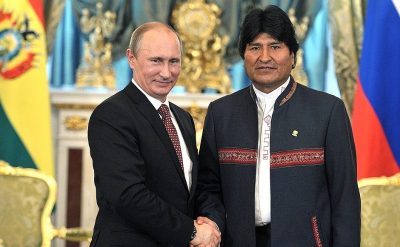Russia’s Bolivia Gambit Is a Bold Economic Move

Bolivian President Evo Morales visited Moscow last week and announced that his country is interested in stepping up lithium cooperation with Russia, which if successful and taken to its fullest extent could see the Eurasian Great Power leverage its global strategic competitiveness in the resource extraction industry to become an indispensable component of the high-tech supply chain that’s driving the 21st-century economy.
***
Russia’s usually written off by Westerners as nothing more than a “gas station” when it comes to its role in the global economy, but that might be about to change after the Bolivian President’s visit to Moscow last week. The South American leader announced that his country is interested in stepping up lithium cooperation with Russia in order to complement the two sides’ existing activity in the oil, gas, and nuclear energy spheres, which would represent a bold economic move if successful and taken to its fullest extent. TeleSur cited Foreign Policy Review in its article about President Morales’ trip to inform their audience that the landlocked country’s Uyuni salt flats are estimated to contain approximately 50-70% of the world’s lithium supplies that are becoming increasingly important in the 21st-century economy due to their role in “making high-powered batteries for cell phones, laptops, and hybrid cars”, to say nothing of this resource’s military applicability in the aforementioned three products and others.
Russia’s global strategic competitiveness in the resource extraction industry could enable it to become an indispensable component in this high-tech supply chain if it’s able to clinch the appropriate deals with Bolivia and deliver as needed to the global marketplace, thereby positioning the Eurasian Great Power to occupy an irreplaceable niche in the world’s future economy. The unparalleled opportunities that this presents could greatly enable President Putin to fulfill his “Great Society” vision of socio-economic development at home if Russian companies take advantage of these strategic economic inroads and end up creating more jobs inside the country as a result, which in turn could see them contributing more revenue to the national budget and ensuring that this gambit brings benefits to the general population at large, even if indirectly in that respect. As with all positive developments in the emerging Multipolar World Order, however, it can be expected that the US will do all it can to reverse this progress and regain its fading influence.
The author drew attention to some of the Hybrid War vulnerabilities facing Bolivia in a 2016 briefing for Global Research, which touched upon how its cosmopolitan population could be turned against one another through the external exploitation of preexisting identity tensions and the manipulation of labor rights disputes in order to divide-and-rule the country through the “Bosnification of Bolivia” via the prospective post-conflict outcome of “Identity Federalism“. When factoring in the “politically inconvenient” fact that much of its oil and gas is located in the so-called “Media Luna” of opposition-friendly and right-wing-leaning eastern regions, it’s easy to see how economic-energy populism could be weaponized there on the purported infowar basis that the areas with the greatest natural riches are subsidizing the government’s socialist experiment for the rest of the population elsewhere in the western part of the country whose lithium deposits have yet to be extracted on significant enough of a scale to make a significant difference to balance out the lopsided wealth distribution.
Bolivia is well aware of how vulnerable it is to this asymmetrical onslaught to its sovereignty, especially in the context of President Morales’ “controversial” campaign for a fourth term in office later this year after the Supreme Court ruled in his favor following a narrowly failed 2016 referendum on this issue, which might be why it extradited an Italian fugitive and communist militant back to Brazil shortly after Bolsonaro’s inauguration as a “peace offering” to Trump’s ideological proxy in the hopes that this would help “buy time” and get the US to reconsider its expected Color Revolution push. That effort doesn’t seem to have yielded any positive results, however, since Commander of US SOUTHCOM Admiral Faller denounced Bolivia alongside the so-called “Troika of Tyranny” as one of the four “autocratic regimes” in the region that he accused Russia of “propping up” while speaking before the Senate Armed Services Committee’s Emerging Threats subcommittee, strongly hinting that the US is considering waging a forthcoming regime change campaign there like in the other three countries.
Faced with this latent threat, Bolivia might end up being the scene of Russia’s second “Democratic Security” intervention after Venezuela in the sense that Moscow might dispatch military equipment and advisors to the landlocked country if it comes under Hybrid War siege, though this would be much more difficult to pull off considering that the recipient nation is surrounded by staunch US allies who almost certainly wouldn’t allow this to happen during a crisis scenario. As such, Russia would have to creatively engineer other methods to help the democratically elected and legitimate government of President Morales withstand the pressure that it might come under in the run-up to the vote and immediately preceding it if the opposition is ordered by the US to riot or worse in the event that the incumbent wins. After all, Russia’s Bolivian gambit is a bold economic move that potentially carries with it global importance if Moscow succeeds in using the South American state to gain control of the world’s lithium trade, and the Eurasian Great Power isn’t expected to give up so easily.
*
Note to readers: please click the share buttons above or below. Forward this article to your email lists. Crosspost on your blog site, internet forums. etc.
Andrew Korybko is an American Moscow-based political analyst specializing in the relationship between the US strategy in Afro-Eurasia, China’s One Belt One Road global vision of New Silk Road connectivity, and Hybrid Warfare. He is a frequent contributor to Global Research.
Featured image is from kremlin.ru

